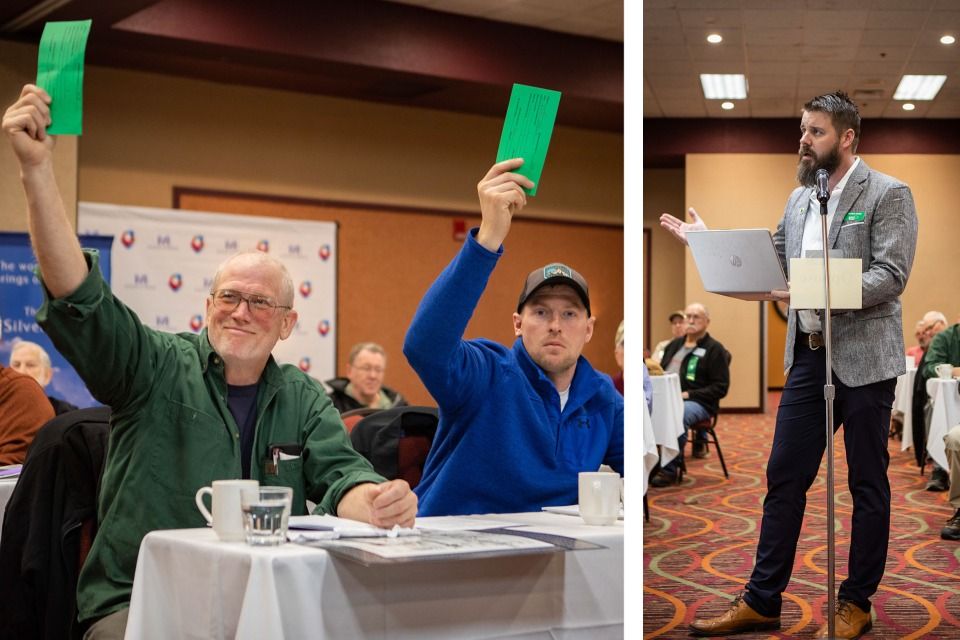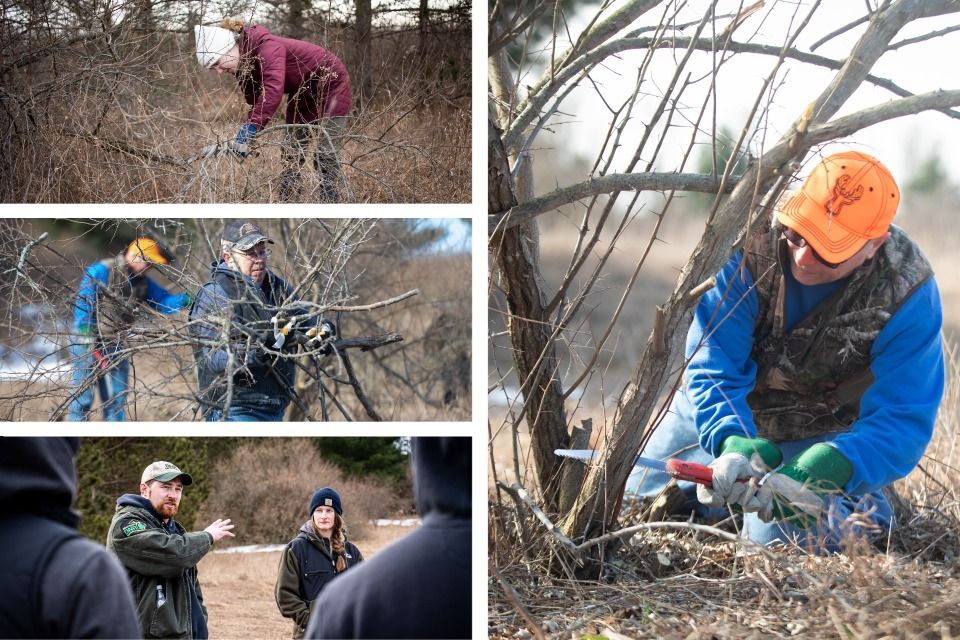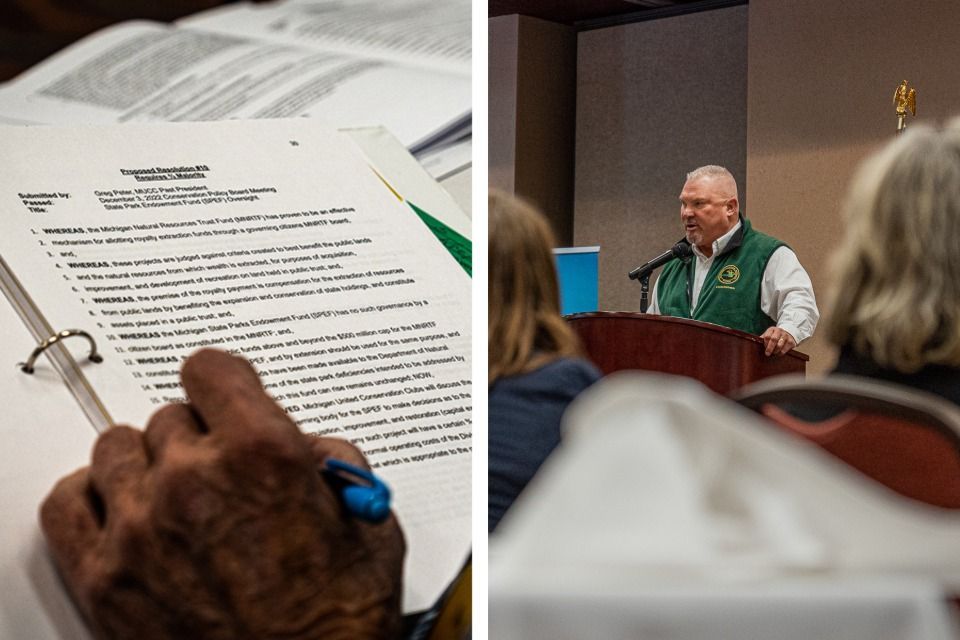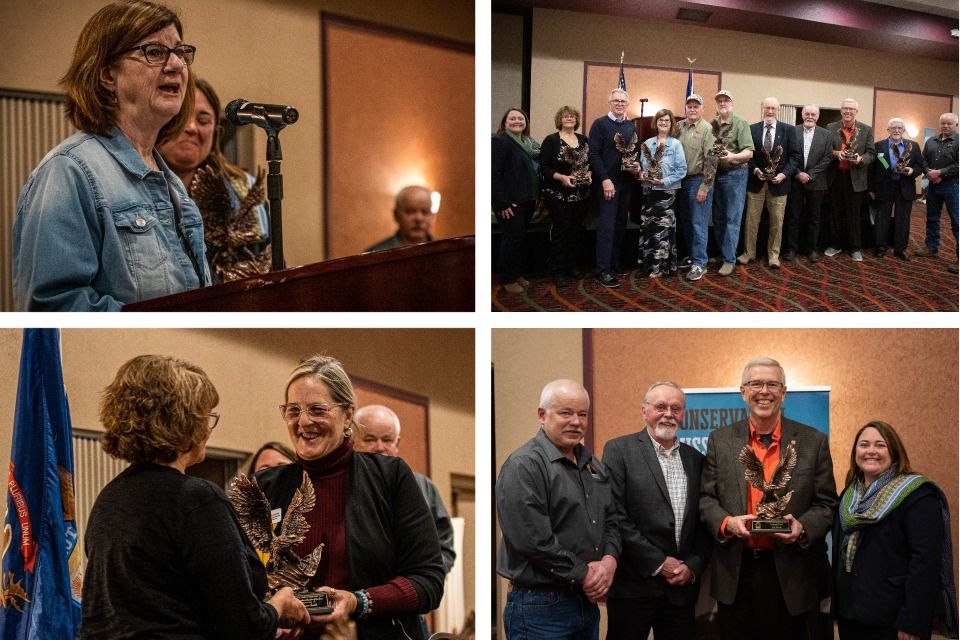MUCC Annual Convention: 16 resolutions, 7 conservation awards, camraderie
Conservationists built brush piles for small game habitat, debated conservation policy resolutions and recognized those among them for outstanding achievements at the 2023 MUCC Annual Convention last weekend.
Michigan United Conservation Clubs convention weekend culminated in the organization’s grassroots policy process Saturday and Sunday. Members considered 16 policy resolutions (click here) and six bylaws amendments.
Affirmation of the organization’s opposition to the expansion of Camp Grayling, tracking wounded deer with dogs and implementing a turkey reporting system were some notable policy topics debated.
Natural Resources Commissioner (NRC) John Walters presented the keynote address Saturday at lunch, focusing on his path to conservation and his vision for managing species in Michigan, specifically white-tailed deer.
Members showed up invigorated and ready to do the work, MUCC Executive Director Amy Trotter said.
“Whether it was commissioner Walters’ impassioned keynote about not being stagnant and complacent in the way we think about wildlife and habitat management,” Trotter said. “Or the energy our members brought to the table, this was one of the most productive and mission-focused conventions I have been a part of in 16 years.”
On the Ground & Cocktails with Commissioners
Friday morning, more than 25 MUCC staff, members and supporters removed invasive autumn olive from the Edmore State Game Area and used it to build brush piles for small game and songbirds.
A dozen brush piles were built and 3 acres of wildlife habitat were improved. Read our recap and see photos of the event on our website (click here) to learn more.
NRC commissioners joined us Friday evening for Cocktails with Commissioners, sponsored by Jay’s Sporting Goods, to get to know MUCC members, their stories and what they care about.
Many thanks to commissioners Carol Rose, chair Tom Baird, Dave Cozad and Leslie Love for stopping in and mingling with our members.
Trotter said it takes a community to get the work of conservation done.
“When we can bring together our members, staff and the decision-makers who we work with, open lines of communication are born and relationships strengthened,” Trotter said. “Commissioners are hunters, anglers and conservationists like the rest of us. It’s important for our members to experience that.”
Policy Resolutions
About 70 clubs and most individual member regions were represented by 113 voting delegates who attended the business portion of the convention on Saturday and Sunday.
Resolutions related to tracking wounded deer with dogs, mandatory turkey harvest reporting and hunters being allowed a leftover bear tag where quotas allow without losing their preference points were heavily debated among members.
NRC Commissioner Walters said the process, debate and discussion surrounding various topics was inspiring.
“I was tremendously honored to attend my first MUCC Annual Convention and give the keynote address,” Walters said. “Sharing my background, path to conservation and my vision for management in the future is important and helps ensure transparent, productive dialogue.”
Dog tracking white-tailed deer was the most debated topic (click here) with a fair number of passionate supporters both for and against much of the resolution’s original language.
Our members are here to guide staff and the organization in its advocacy work, said Justin Tomei, MUCC policy assistant.
“The tracking dog debate was the perfect example of valid, pertinent points made for and against the resolution,” Tomei said. “Member debate and passage helps ensure that the issues we advocate for and work on carry the weight of our 40,000 members and clubs.”
Opposition to the expansion of Camp Grayling was loud and members passed a resolution reaffirming the organization’s support of public access and public lands (click here).
A resolution asking that MUCC work with the Michigan DNR to allow hunters to retain their bear preference points if they utilize an over-the-counter, leftover tag was heavily debated but ultimately passed.
Conservation Awards Banquet
Seven conservationists were recognized for their contributions to conservation (click here) , including the organization’s 50 Years of Service to Conservation Award given to Pete Demos posthumously.
Demos was a longtime MUCC Club Member, an ardent conservationist and went above and beyond to ensure that the species and habitats he loved flourished.
Demos’ son-in-law, Mike Neymenowski, accepted the award on his behalf.
“I know Pete would be smiling down on all of us right now,” he said. “His daughters and I are all very thankful for this; we know he would have been so proud of this achievement. MUCC meant so much to him.”
MUCC Election Chairwoman Katherine “Kay” Leja received the 2023 Sue Pride Unsung Hero Award for her decades of selfless service and behind-the-scenes work on MUCC’s election process.
Leja recalled her mother and father, other MUCC members and family who helped mentor her in the organization.
“Coming back each year for the convention and helping MUCC undertake its election process is my way of giving back to conservation,” Leja said.
Award winners include: Deann Smith, 2023 Educator of the Year; Paul Thomson, 2023 Forest & Park Conservationist of the Year; U.P. Whitetails of Marquette County, 2023 Affiliate of the Year; and Tim Eiseman, 2023 Land Conservationist of the Year.
Erik Schnelle, National Deer Association state chair for Michigan, was presented with the 2023 Past President’s Award. Past President George Lindquist presented the award and noted Erik’s tenacity and calm demeanor as traits helping him successfully advocate for conservation policy.
“Erik’s engagement with conservation goes beyond just white-tailed deer and the organization he represents,” Lindquist said. “He truly cares about all things conservation and uses real-world facts and examples to help illustrate his points.”

Elections
Members voted for open MUCC Executive Board and Conservation Policy Board seats throughout the weekend.
On Sunday, it was announced that George Lindquist (Region 1), Terry Vuksanovic (Region 3), Dawn Levey (Region 5), Brent Tavis (Region 5 At-large), Nadeene Delong (Region 6), Ron Burris (Region 7) and Sam Morello (Region 9) would all join the executive board,
Board members Jeremery Laakso, Jane Finnerty, Ed Moore and Dan McMaster came off the board. MUCC thanks them for their service to the organization.
To view the full list of Executive and Conservation Policy Board members, please visit our website by clicking here (click here).
The post MUCC Annual Convention: 16 resolutions, 7 conservation awards, camraderie appeared first on Michigan United Conservation Clubs.
Recent Posts






